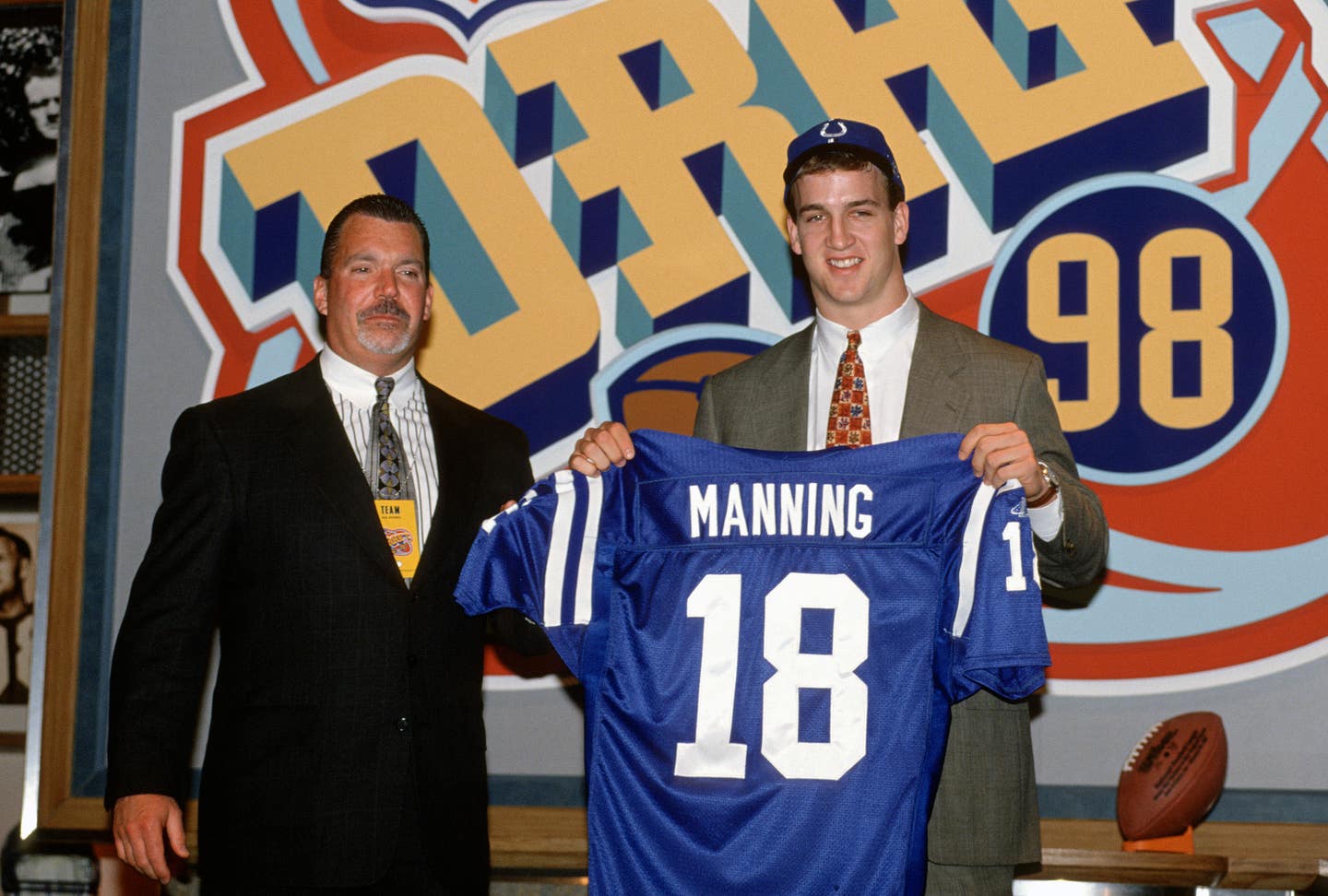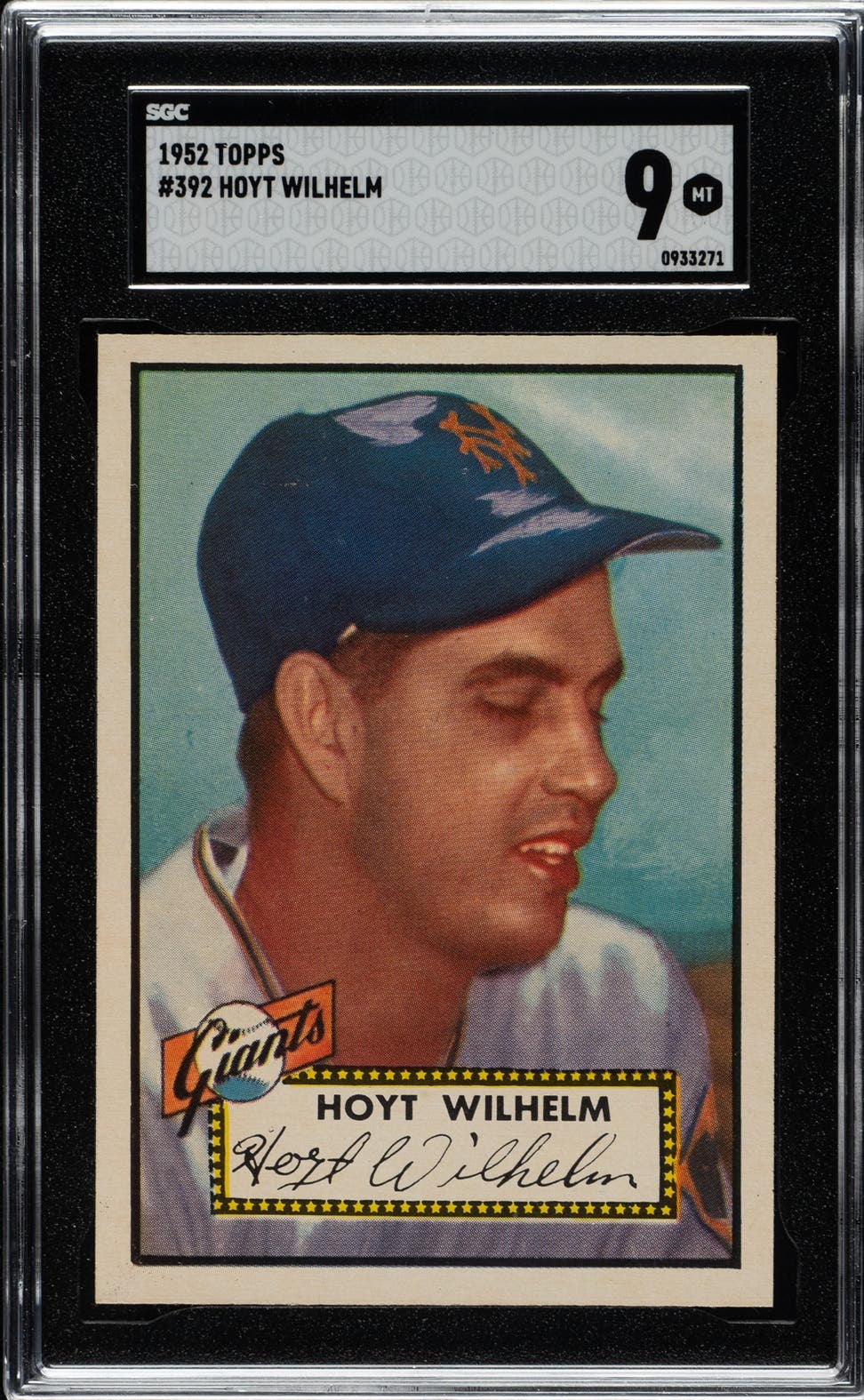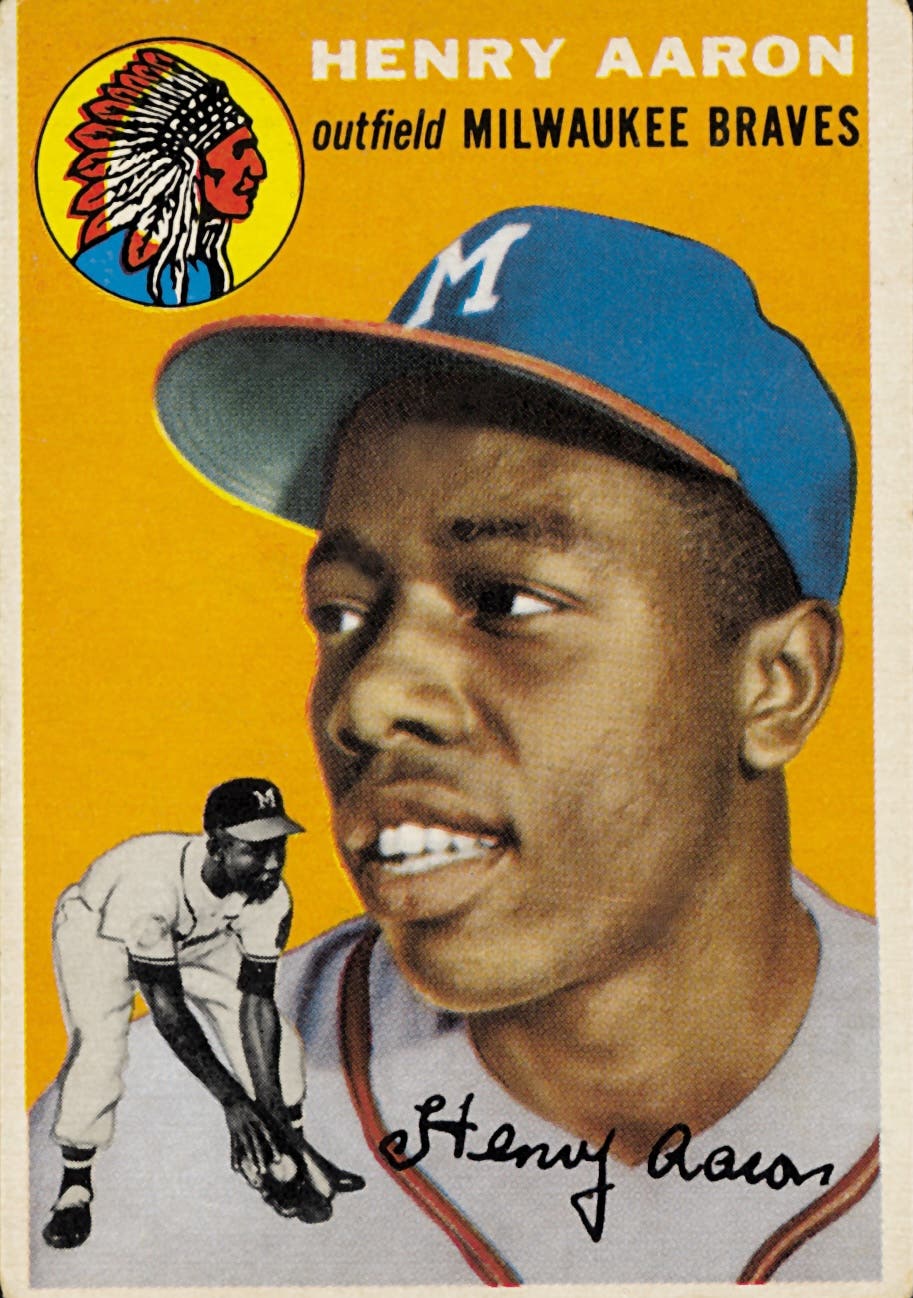
Terry Bradshaw
BOOM & BUSTS: Rookie cards for all NFL No. 1 draft picks since 1936
With the 2024 NFL Draft scheduled for April 25-27, we offer the next article in our series on collecting No. 1 draft picks.
The NFL version is much longer than the first article on MLB Draft picks since the NFL Draft began in 1936. (Prior to 1967, the NFL and AFL both held their own drafts.)
There are many recognizable names on this list, but others may prompt you to ask, “Who?”
The most well-known picks have cards you will have to invest some money in to add to your collection, while others can be found for next to nothing. Enjoy this guide as we remember the top NFL picks over the past 87 years and their rookie cards.
2023: Bryce Young, QB, Panthers
Rookie Card: 2021 Wild Card Illumination #ANBC-7; 2023 Panini Instant NFL Draft Night #1
There was some debate on whether the Panthers would take Young or CJ Stroud with the first pick in 2023. Now the selection by the Panthers has some questions. Young did not have much protection or the offensive weapons around him, so his rookie campaign was not stellar. He finished with almost 2,900 yards passing on a 60 percent completion rate with 11 touchdowns and 10 interceptions. The Panthers’ 2024 draft is a priority to give him some sort of supporting cast.
2022: Travon Walker, DE, Jaguars
Rookie Card: 2019 Leaf #85; 2022 Panini Instant #1
2021: Trevor Lawrence, QB, Jaguars
Rookie Card: 2021 Panini Prizm Draft Picks #106; 2021 Panini Mosaic #301; 2021 Panini Illusions #59; 2021 Panini Chronicles #201
Everyone knew the Jags would take Lawrence with the first pick in 2021. His rookie season was not typical to what Lawrence is used to: a 3-14 record, 60 percent completion rate, 12 TDs vs. 17 interceptions. But he quickly emerged as one of the NFL’s best in 2022, passing for 4,113 yards and leading the Jags to the playoffs, and followed it up with another 4,000-yard season in 2023.
2020: Joe Burrow, QB, Bengals
Rookie Card: 2020 Donruss Rated Rookie #301; 2020 Panini Mosaic #201; 2020 Panini Prizm #307
Also See: More collectible Super Bowl quarterbacks
The 2019 Heisman Trophy winner and national champion was a slam dunk for the first pick and the Bengals brought him back in close proximity to his hometown. As a rookie, he played in 10 games before a season-ending knee injury, going 2-7-1 with 13 touchdowns and five interceptions. In his second season, he led the Bengals to the Super Bowl after completing 70.4 percent of his passes for 4,611 yards, 34 touchdowns and a 104.3 passer rating. He made the Pro Bowl in 2022 before suffering another injury-riddled season in 2023.
2019: Kyler Murray, QB, Cardinals
Rookie Card: 2019 Panini Absolute #126; 2019 Panini Illusions #1; 2019 Panini Score #384
A lot of No. 1 picks tend to be talented in more than one sport. Not many can say they were drafted top-10 in two sports in the same year, but Murray can make that claim. Not only was he drafted first by the Cardinals but he also was drafted ninth overall by MLB’s Oakland A’s. He decided to stay with football and the Cardinals obviously were happy with that plan. He finished with a 5-10-1 record with 20 touchdowns and 12 interceptions as a rookie in 2019, and made the Pro Bowl in his second season. He led the Cardinals to the playoffs in 2021 before missing much of the last two seasons with a knee injury.
2018: Baker Mayfield, QB, Browns
Rookie Card: 2018 Panini Prizm #201; 2018 Panini Select #30; 2018 Panini Donruss #303
After being drafted by the Browns, Mayfield came off the bench in Week 3 and led the team to its first victory in 19 regular season games. He led the Browns to the playoffs in 2020 before struggling in 2021 and moving on to the Panthers and Rams. He experienced a career resurgence in 2023, leading the Buccaneers to the playoffs with 4,044 yards passing and 28 TDs.
2017: Myles Garrett, DE, Browns
Rookie Card: 2017 Donruss #356; 2017 Panini Select #105; 2017 Donruss Optic #106
Garrett was the first of back-to-back No. 1 picks for the Browns. He has lived up to it with five Pro Bowl and five All-Pro selections and 88.5 sacks in seven seasons.
2016: Jared Goff, QB, Rams
Rookie Card: 2016 Panini Prizm #208; 2016 Donruss #372
The Rams traded up to select Goff, who became the starter in Week 10 of his rookie year. He made the Pro Bowl in 2017 and 2018, and led the Rams to the Super Bowl in 2018 before being traded to the Lions in 2021. He returned to the Pro Bowl in 2022 and led Detroit to the NFL championship game in 2023.
2015: Jameis Winston, QB, Buccaneers
Rookie Card: 2015 Score #366; 2015 Topps Chrome #200
The youngest player to win the Heisman Trophy, Winston passed for 4,042 passing yards and 22 touchdowns but had 15 interceptions as a rookie, a trait that has plagued him throughout his career. He made the Rookie All-Pro team in 2015 and had similar numbers the next three seasons but injuries started to mount. He moved on to the Saints in 2020 but has been a backup for most of his career.
2014: Jadeveon Clowney, DE, Texans
Rookie Card: 2014 Topps Platinum #131; 2014 Panini Prizm #285, 2014 Topps Chrome #16
Clowney made the Pro Bowl three times with the Texans before playing for four different teams from 2019-23. He has 52.5 career sacks. An All-American for South Carolina, Clowney has signed to play for his hometown Carolina Panthers for 2024.
2013: Eric Fisher, OT, Chiefs
Rookie Card: 2013 Bowman #176; 2013 Topps #368; 2013 Score #349
2012: Andrew Luck, QB, Colts
Rookie Card: 2012 Topps #140; 2012 Topps Chrome #D291
One of the “what might have been” players, Luck lived up to high expectations before injuries forced him to retire after just six seasons. He set a rookie passing record in 2012 with 4,374 yards, led the Colts to the playoffs four times, and made the Pro Bowl four times before missing the entire 2017 season with a shoulder injury and retiring after the 2018 season.
2011: Cam Newton, QB, Panthers
Rookie Card: 2011 Topps #200; 2011 Topps Chrome #1
A rare 6-5, 235-pound quarterback who could run and throw, Newton won the 2010 Heisman Trophy and national championship at Auburn before becoming the NFL Offensive Rookie of the Year with a record 4,051 passing yards and 14 rushing touchdowns. He led the Panthers to the playoffs in 2013 and to a 15-1 record and the Super Bowl in 2015, when he won NFL MVP with 3,837 yards passing, 10 rushing TDs and 35 total touchdowns. Newton finished his injury-riddled career with more than 38,000 passing and rushing yards and 269 combined touchdowns.
2010: Sam Bradford, QB, Rams
Rookie Card: 2010 Topps Chrome #TMB-1; 2010 Press Pass #30
2009: Matthew Stafford, QB, Lions
Rookie Card: 2009 Panini Prestige #172; 2021 Panini Prizm #67
Stafford’s storybook career tells the tale of a quarterback with tons of potential who waited patiently to finally win the big one. Stafford led the Lions to just four winning seasons and three playoff appearances in 12 seasons. But at the end of 2020, the Lions traded him to the Rams, where he led LA to a 12-5 record in 2021 and a win in Super Bowl 56. Stafford has passed for more than 56,000 yards and 357 touchdowns.
2008: Jake Long, OT, Dolphins
Rookie Card: 2008 Bowman #224; 2008 Topps #387
2007: JaMarcus Russell, QB, Raiders
Rookie Card: 2007 Bowman Chrome #BC56; 2007 Score #331
2006: Mario Williams, DE, Texans
Rookie Card: 2006 Topps #351; 2006 Score #363
2005: Alex Smith, QB, 49ers
Rookie Card: 2005 Score #331; 2005 Topps #435
2004: Eli Manning, QB, Chargers
Rookie Card: 2004 Bowman #111; 2004 Fleer Ultra #201
Manning, the second QB from the line of father Archie, was the No. 1 pick of the Chargers, but declined to play for San Diego. So a trade sent Eli to the Giants and Phillip Rivers to the Chargers. Although he struggled in his rookie season, going 1-6 as a starter, he started all but one game for 14 straight seasons. He had a winning record in seven seasons, including Super Bowl wins in 2007 and 2011, both over the New England Patriots. His career ended with 57,023 passing yards and 366 touchdowns.
2003: Carson Palmer, QB, Bengals
Rookie Card: 2003 Fleer Ultra Gold Medallion #161; 2003 Topps #311
The Bengals handed Palmer the reins for 13 games in 2004 and he started all 16 games the next three seasons, leading the Bengals to the playoffs in 2005 and 2009. After the 2010 season, he was traded to the Raiders, where he started 24 games in two seasons. He was then traded to Arizona, where he played three full and two partial seasons with a record of 38-21-1. He led the Cardinals to the NFC Championship game in 2015 and finished his career with more than 46,000 passing yards and 294 touchdowns.
2002: David Carr, QB, Texans
Rookie Card: 2002 UD Authentics #113; 2002 Donruss #201
2001: Michael Vick, QB, Falcons
Rookie Card: 2001 Topps #311; 2001 Upper Deck #283
Vick started a run of five straight quarterbacks taken No. 1 and took the league by storm, both on and off the field. The Falcons handed him the keys in 2002 and he changed the position with his running ability, rushing for more than 750 yards while passing for almost 3,000. After suffering a broken leg in 2003, he passed for almost 2,500 yards and rushed for more than 400 in each of the next three seasons. In 2006, he became the first quarterback to rush for over 1,000 yards in a season. But after the 2006 season, Vick was implicated in a dogfighting ring, which resulted in a 21-month prison sentence. He missed two seasons and the Falcons ultimately released him. He signed a one-year contract with the Eagles in 2009 and became the starter for the next three seasons. In 2010, he won NFL Comeback Player of the Year and finished second in MVP voting. His career numbers were highlighted by over 23,000 yards passing, 6,300 rushing, and 175 total touchdowns.
2000: Courtney Brown, DE, Browns
Rookie Card: 2000 Topps #373; 2000 Score #278
1999: Tim Couch QB, Browns
Rookie Card: 1999 Donruss #141; 1999 Stadium Club #143
1998: Peyton Manning, QB, Colts
Rookie Card: 1998 Bowman #1; 1998 Topps Gold Label #20
One of the most talented and popular players on this list, Manning was selected No. 1 by the Colts after leaving the University of Tennessee as its all-time leading passer. His list of accolades is long: Five MVP awards (NFL record); First-team All-Pro seven times; 14 Pro Bowls; and four Super Bowl appearances with two wins. He also set records for most passing yards and touchdowns in a season as well as seasons with over 4,000 passing yards. He was not only talented but also durable, starting every game from 1998 to 2014 with the exception of the 2011 season when he was out all year with a neck injury. He had only two seasons with a losing record. He played with the Colts until 2012 when he was released so the team could draft Andrew Luck. He landed with the Broncos and led them to the 2015 Super Bowl win before retiring. His stellar career ended with a 200-92 record with more than 80,000 passing yards and 582 touchdowns. He was elected to the Pro Football Hall of Fame in 2021.
1997: Orlando Pace, OT, Rams
Rookie Card: 1997 Score #273; 1997 Fleer Ultra Rookies #2
The Rams selected the two-time All-American out of Ohio State to anchor their offensive line. The next four seasons he started every game and made three straight Pro Bowls. In 2005, he signed a seven-year deal before injuries began to plague him. In 2009, he was released by the Rams and signed a three-year contract with the Bears. The seven-time Pro Bowler retired in 2010 and was elected to the Pro Football Hall of Fame in 2016.
1996: Keyshawn Johnson, WR, Jets
Rookie Card: 1996 Topps #430; 1996 Bowman’s Best #180
After a 100-catch season with the USC Trojans, Keyshawn Johnson found himself selected No. 1 by the green team from the Big Apple. Johnson spent four seasons with the Jets, where he caught over 300 passes for over 4000 yards and 31 touchdowns. He was traded to the Buccaneers, where he spent four seasons, catching almost 300 passes for over 3,900 yards and 17 touchdowns. He finished his career with 814 receptions, over 10,000 receiving yards and 76 touchdowns. He made the Pro Bowl three times and won the Super Bowl in 2002.
1995: Ki-Jana Carter, RB, Bengals
Rookie Card: 1995 Topps Finest #225; 1995 Fleer NFL Prospects #5
1994: Dan Wilkinson, DT, Bengals
Rookie Card: 1994 Fleer Ultra #54; 1994 Upper Deck SP #1
1993: Drew Bledsoe, QB, Patriots
Rookie Card: 1993 Topps Stadium Club #280; 1993 Wild Card #34
Forever known as the QB that Tom Brady replaced, Bledsoe started 12 games in 1993 and all but three games from 1994-2000, leading New England to the playoffs three times. He signed a 10-year contract in 2001, but in the third game, took a big hit and tore a blood vessel in his chest. Brady took over and never relinquished the job. The Pats traded Bledsoe to the Bills, where he started every game for three seasons with a 23-25 record but no playoff berths. He was released in 2004 and moved on to the Cowboys. He retired after the 2006 season with 44,611 passing yards and 251 touchdowns.
1992: Steve Emtman, DE, Colts
Rookie Card: 1992 Upper Deck #409; 1992 Action Packed Update #1
1991: Russell Maryland, DT, Cowboys
Rookie Card: 1991 Pro Set #32; 1991 Fleer Ultra Update #U-21
1990: Jeff George, QB, Colts
Rookie Card: 1990 Pro Set #669; 1990 Topps #298
1989: Troy Aikman, QB, Cowboys
Rookie Card: 1989 Score #270; 1989 Pro Set #490
One of the key cogs of the Cowboys’ dynasty, Aikman struggled in his first two seasons but made the first of six straight Pro Bowls in 1991 and led the team to back-to-back Super Bowl wins in 1992 and 1993. The Cowboys made the NFC Championship game in 1994, and then won another title in 1995. Aikman retired after the 2000 season with a 105-75 record as a starter with 37,480 passing yards and 193 touchdowns. He made the Pro Football Hall of Fame in 2006 and is now a popular NFL color commentator on Monday Night Football.
1988: Aundray Bruce, LB, Falcons
Rookie Card: 1989 Topps #337
1987: Vinny Testaverde, QB, Buccaneers
Rookie Card: 1988 Topps #352
1986: Bo Jackson, RB, Buccaneers
Rookie Card: 1988 Topps #327
Considered one of the top athletes in sports history, Jackson signed with the Kansas City Royals in 1986 and started playing pro baseball. He was drafted again in the seventh round of the 1987 NFL Draft and signed with the Raiders, allowing him to play both sports. He played in seven games in 1987 with 554 rushing yards and six touchdowns and would go on to play in at least 10 games a year over the next three seasons before a hip dislocation in a 1990 playoff game ended his season and ultimately his football career. His final career numbers were 2,782 rushing yards and 18 touchdowns. He played eight seasons in MLB, making the All-Star team in 1989 and becoming the only player ever named an All-Star in both sports.
1985: Bruce Smith, DE, Bills
Rookie Card: 1986 Topps #389
The defensive end from Virginia Tech was not only drafted first in the NFL Draft but also the USFL Draft. Smith spent 15 seasons with the Bills and helped the team reach four Super Bowls. After his stint in Buffalo, he played four more seasons in Washington. He had double-digit sacks in 13 seasons for a career total of 200. He also had over 1,200 tackles and was elected to the Hall of Fame in 2009.
1984: Irving Fryar, WR, Patriots
Rookie Card: 1985 Topps #325
1983: John Elway, QB, Colts
Rookie Card: 1984 Topps #63
Elway declared that he would not play for the Colts, which traded him to the Broncos, and the rest is history. Not only did Elway go on to be the most famous player in Broncos’ history but he now runs the team in the front office. In 1986, he led the Broncos over the Browns in the AFC Championship Game with the famous 98-yard “Drive” to win the game. The Broncos lost the Super Bowl but Elway led the team back to the big game again in 1987 with an MVP season. Elway and the Broncos lost the Super Bowl again in 1989 before finally winning it in 1997 and ’98. He retired after the 1998 season with five Super Bowls appearances and a 162-89-1 record. A nine-time Pro Bowler, he ended his career with over 57,000 passing yards, 330 passing touchdowns and 39 rushing touchdowns. He was elected to the Hall of Fame in 2004.
1982: Kenneth Sims, DE, Patriots
Rookie Card: 1983 Topps #336
1981: George Rogers, RB, Saints
Rookie Card: 1982 Topps #410
The Saints felt the pressure to pick the Heisman Trophy-winning running back in Rogers. They used him as a workhorse and that paid off as Rogers rushed for 1,674 yards and 13 touchdowns in his rookie season. He suffered some nagging injuries and only played in five games the following season. He had over 900 rushing yards the next two seasons before the Saints traded him to the Redskins. In Washington, he played three seasons and rushed for over 1,000 yards twicce. He played in the 1987 Super Bowl before the injuries forced him to call it a career after seven seasons.
1980: Billy Sims, RB, Lions
Rookie Card: 1981 Topps #100
Sims went to the Lions as a two-time All-American and Heisman Trophy winner. He was a workhorse his first season in Detroit, rushing 313 times for 1,303 yards and 13 touchdowns and making the Pro Bowl. It would be the first of three straight Pro Bowl seasons for Sims, who helped the Lions get back to the playoffs. After the 1983 season, injuries too their toll and Sims retired in 1986 as the all-time leading rusher for the Lions to that point.
1979: Tom Cousineau, LB, Bills
Rookie Card: 1983 Topps #246
1978: Earl Campbell, RB, Oilers
Rookie Card: 1979 Topps #390
Campbell made a big splash by winning NFL Offensive Player of the Year as a rookie with 1,450 yards and 13 touchdowns. He helped the Oilers make the playoffs in three straight seasons with 1,697 yards rushing in 1979 and 1,934 in 1980. His 1979 season, which included 19 touchdowns, helped him win NFL MVP. In 1984, the Oilers traded Campbell to the Saints, reuniting him with his first head coach, Bum Phillips. He retired after the 1985 season with 9,827 yards and 78 touchdowns. He was elected to the NFL Hall of Fame in 1991.
1977: Ricky Bell, RB, Buccaneers
Rookie Card: 1979 Topps #258
1976: Lee Roy Selmon, DE, Buccaneers
Rookie Card: 1977 Topps #29
Selmon had the unique honor of being the first player selected for the expansion Tampa Bay Buccaneers. His brother, Dewey, was drafted by the Bucs in the second round of the same draft. Lee Roy made six Pro Bowls in nine seasons. He was inducted into the Hall of Fame in 1995. He died of a stroke in 2011.
1975: Steve Bartkowski, QB, Falcons
Rookie Card: 1976 Topps #35
The Falcons handed the reins immediately to Bartkowski and he delivered in 1975 with a Rookie of the Year season, passing for 1,662 yards and 13 touchdowns. He fought some injuries the next two seasons before the Falcons gave him control of the offense for good in 1978. He threw for over 1,900 yards each of the next seven seasons. He made the Pro Bowl in 1980 with 3,544 passing yards and 31 touchdowns to finish third in MVP voting. He also made the Pro Bowl in 1981. He finished his career with over 24,000 yards.
1974: Ed Jones, DE, Cowboys
Rookie Card: 1976 Topps #427
Most don’t know that “Too Tall” Jones was a multi-sport athlete. He had multiple offers from MLB teams to play first base. He also dabbled in boxing and left football for a season in 1979 to pursue a professional career in the ring. He signed in college to play pro basketball but switched to football after two seasons. In 1974, he was the first No. 1 pick for the Cowboys franchise. He ended up playing 15 seasons, all with the Cowboys. His finished his career with 106 sacks and made the All-Pro team and Pro Bowl three times, helping the Cowboys reach three Super Bowls.
1973: John Matuszak, DE, Oilers
Rookie Card: 1974 Topps #148
1972: Walt Patulski, DE, Bills
Rookie Card: 1973 Topps #293
1971: Jim Plunkett, QB, Patriots
Rookie Card: 1972 Topps #65
The Boston Patriots (later known as the New England Patriots) selected Plunkett with their first pick. In his first four seasons, Plunkett started all 14 games and was second in Offensive Rookie of the Year voting in 1971. In 1975, a shoulder injury sidelined him for much of the year and at season’s end, he was traded to the 49ers. He moved to Oakland in 1979 and led the Raiders to a Super Bowl victory in 1980, the first ever by a Wild Card team. In 1983 he came off the bench again at midseason and led the team to another Super Bowl victory, this time over Washington. He retired after the 1986 season with over 25,000 passing yards and 164 touchdowns.
1970: Terry Bradshaw, QB, Steelers
Rookie Card: 1971 Topps #156
Bradshaw became the No. 1 pick in 1970 when the Steelers won a coin flip over the Bears. He became the starter in year two and never looked back, leading Pittsburgh to four Super Bowl wins (1974, ’75, ’78 and ’79). He was MVP of two of those Super Bowls and also won the league MVP in 1978. The Steelers won eight AFC championships with Bradshaw, who made three Pro Bowl appearances. He was elected to the Hall of Fame in 1989 and went on to a successful career as an actor and NFL TV analyst. His rookie card is one of the most sought after in the hobby.
1969: O.J. Simpson, RB, Bills
Rookie Card: 1970 Topps #90
Simpson was the first No. 1 pick in any sport to refuse to play without getting paid what he wanted. He threatened going into acting since he was already based in LA, and the owner of the Bills agreed to his terms. He had fewer than 750 rushing yards and five touchdowns in each of his first three seasons, but in 1972, he hit his stride as he rushed for 1,251 yards and six touchdowns. In 1973 he broke Jim Brown’s rushing record with 2,003 yards and 12 touchdowns to win NFL MVP. He was the first player to break 2,000 yards rushing and is the only rusher to do it in a 14-game season. He would follow with three more 1,000-yard seasons. 1977 was his last season in Buffalo as the Bills traded him to the 49ers, where he spent two seasons before retiring. He finished his career with over 11,000 rushing yards and six Pro Bowls. He would go on to a career in acting and as a sports announcer before becoming notorious for his off-field legal issues. He died on April 10 at age 76.
1968: Ron Yary, OT, Vikings
Rookie Card: 1972 Topps #104
1967: Bubba Smith, DE, Colts
Rookie Card: 1970 Topps #114
1966: Tommy Nobis, LB, Falcons
Rookie Card: 1967 Philadelphia #7
1965: Tucker Frederickson, RB, Giants
Rookie Card: 1966 Philadelphia #122
1964: Dave Parks, WR, 49ers
Rookie Card: 1965 Philadelphia #180
1963: Terry Baker, QB, Rams
Rookie Card: 1984 Cramer Pac-10 Legends #24
1962: Ernie Davis, RB, Redskins
Rookie Card: 1962 Topps #36
One of the sadder stories on this list, Davis was drafted by the Redskins after becoming the first black player to win the Heisman Trophy while at Syracuse. Washington traded him to the Cleveland Browns but before he played a game, he was diagnosed with leukemia. He played in one preseason game but died in 1963 at the age of 23. His story is portrayed in the movie “The Express.”
1961: Tommy Mason, RB, Vikings
Rookie Card: 1962 Topps #94
1960: Billy Cannon, HB, Rams
Rookie Card: 1960 Fleer #66
1959: Randy Duncan, QB, Packers
Rookie Card: 1961 Fleer #200
1958: King Hill, QB, Cardinals
Rookie Card: 1959 Topps #117
1957: Paul Hornung, RB, Packers
Rookie Card: 1957 Topps #151
When legendary head coach Vince Lombardi talks, people listen. Lombardi called Hornung “the best player he ever coached.” Hornung, who won the Heisman Trophy at Notre Dame, was used as a running back, receiver and kicker because of his versatility. He played his whole career in Green Bay and set records for scoring in a season and in a championship game. He still holds records for most 30-point games and 25-point games in a season. He was elected to the Hall of Fame in 1986 and passed away in 2020.
1956: Gary Glick, S, Steelers
Rookie Card: 1958 Topps #19
1955: George Shaw, QB, Colts
Rookie Card: 1956 Topps #108
1954: Bobby Garrett, QB, Browns
Rookie Card: 1954 Topps #16
1953: Harry Babcock, WR, 49ers
Rookie Card: 1955 49ers Team Issue #3
1952: Bill Wade, QB, Rams
Rookie Card: 1951 Topps #2
Wade was an All-American quarterback at Vanderbilt. He was a backup for his first two seasons with the Rams before winning the starting job in 1958. He made the Pro Bowl in 1958 and led the league in passing yards. In 1961, he was traded to the Bears and started for four seasons, leading the team to the NFL Championship in 1963, when he made the Pro Bowl again. He retired after the 1966 season with 18,530 passing yards and 124 touchdowns. He passed away in 2016 at the age of 85.
1951: Kyle Rote, RB/WR, Giants
Rookie Card: 1952 Bowman #28
Even though he was runner-up for the Heisman Trophy, Rote was still selected No. 1 by the New York Giants. He was a backup in 1951 but became a starter in 1952. He made the Pro Bowl four straight seasons from 1953-1956. He helped the team to the NFL Championship Game in 1956 and 1958 with the Giants taking the title in 1956. He retired in 1961 and joined the coaching staff with the Giants before embarking on a broadcasting career. He was also known as the father of Kyle Rote, Jr., one of the top American soccer players. Rote Sr. died in 2002.
1950: Leon Hart, TE/FB, Lions
Rookie Card: 1950 Bowman #38
1949: Chuck Bednarik, LB, Eagles
Rookie Card: 1948 Leaf #54
“Concrete Charlie” was known as one of the hardest hitters to play the game—his hit sidelined Frank Gifford for 18 months. Playing on both sides of the ball as a center and linebacker, Bednarik played 14 seasons for the Eagles. He helped the team win two NFL Championships in 1949 and 1960. He made the All-Pro team 10 times, the Pro Bowl eight times and is on numerous lists of the game’s all-time greats. He retired in 1962, was inducted into the Hall of Fame in 1967 and died in 2015 at the age of 89.
1948: Harry Gilmer, QB, Redskins
Rookie Card: 1948 Leaf #18
1947: Bob Fenimore, HB, Bears
Rookie Card: None
1946: Frank Dancewicz, QB, Boston Yanks
Rookie Card: 1948 Bowman #74
1945: Charley Trippi, QB, Cardinals
Rookie Card: 1948 Leaf #29
Considered one of football’s first true stars, Trippi was known for his versatility as he played running back, quarterback, defense, kicked field goals and punted. He was drafted for Chicago’s backfield and was paid handsomely—$100,000 over four years—which was unheard of for the time but necessary to keep him from signing with the rival Yankees, both for football and baseball. His versatility paid off as he helped the team win the NFL Championship in 1947 over the Eagles as part of the stacked backfield known as the “Dream Backfield” and the “Million Dollar Backfield”. His played his first four seasons as a halfback (although he played multiple positions) but by 1951, he moved to quarterback for two seasons. He made the Pro Bowl in 1952, and then moved back to halfback for two more years before finishing his career in Chicago in 1955 as a defensive back. His final career stats were 3,506 rushing yards with 23 touchdowns, 2,547 passing yards with 16 touchdowns, and 1,321 receiving yards with 11 touchdowns. He was elected to the Hall of Fame in 1968 and passed away in 2022 at 100 years old.
1944: Angelo Bertelli, QB, Yanks
Rookie Card: 1955 Topps #76
1943: Frank Sinkwich, HB, Lions
Rookie Card: 1955 Topps #69
1942: Bill Dudley, HB, Steelers
Rookie Card: 1948 Bowman #80
1941: Tom Harmon, HB, Bears
Rookie Card: 1955 Topps #35
1940: George Cafego, QB, Chicago Cardinals
Rookie Card: 1955 Topps #8
1939: Ki Aldrich, C/LB, Chicago Cardinals
Rookie Card: None
1938: Corbett Davis, FB, Cleveland Rams
Rookie Card: None
1937: Sam Francis, HB, Eagles
Rookie Card: None
1936: Jay Berwanger, HB, Eagles
Rookie Card: 1955 Topps #78
Berwanger had many firsts in his career, including the first winner of the Heisman Trophy and the first No. 1 draft pick in football history. He demanded a high salary for the time ($1,000 per game), however, and could not come to terms with the Eagles. He was traded to the Bears, but also could not come to terms on a contract and never played a game of professional football. He died in 2002 at the age of 88.








